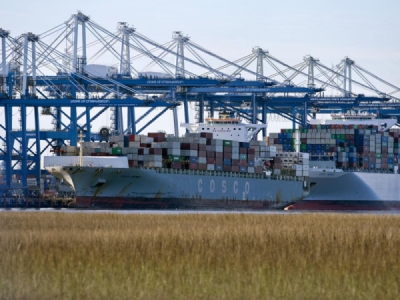
Posted on July 8, 2019
The State Ports Authority is scaling back expectations for containerized cargo growth for its 2020 fiscal year at the Port of Charleston as tariff concerns continue to impact global trade.
The State Ports Authority is scaling back its expectations for growth over the next 12 months as tariffs — both existing and proposed — continue to weigh on the global trade outlook.
At its board meeting last week, the maritime agency projected 2% growth in containerized cargo moving through the Port of Charleston’s terminals in fiscal 2020, which starts Monday. That would amount to a net 1.385 million containers of all sizes.
The projection is down from the actual 8.2% growth in the fiscal year that ended Sunday, with a record number of about 1.35 million boxes moving through the SPA’s two container terminals in Mount Pleasant and North Charleston.
The lower volumes are expected to affect the authority’s finances, with the new budget calling for $45.3 million in operating earnings over the next 12 months — a 16% drop from $54 million for the last fiscal year.
Operating cash flow is projected to rise 6.4% to $97.7 million.
Containerized cargo accounts for more than three-quarters of the authority’s annual revenues.
Jim Newsome, the SPA’s president and CEO, said the lower cargo projection reflects a return to more normal growth patterns following a “very strong” year during which many shippers sent higher volumes of goods early to get ahead of President Donald Trump’s tariffs on Chinese-made goods.
China is the Palmetto State’s top trading partner, sending $7.3 billion worth of goods — about 18% of all imports — to South Carolina in 2018. That was a nearly 10% increase from the prior 12 months.
South Carolina exported $5.6 billion worth of goods to China last year — 16% of all exports valued roughly 10% less than in 2017.
The U.S. has already imposed 25% tariffs on about $200 billion worth of Chinese goods and the White House has proposed adding another $300 billion worth of goods to the list, making virtually all Chinese products subject to the import tax. All of that and more was up for discussion this past weekend at the G-20 Summit in Japan.
In a series of public hearings in June, the U.S. Trade Representative heard from dozens of business leaders who said more tariffs will cause widespread economic damage.
Despite lower expectations for containerized cargo, the authority is forecasting increases in other segments of its business.
The number of finished vehicles sent to foreign markets is projected to rise 21% in the coming year. Volvo Cars recently started shipping S60 sedans built at its Berkeley County plant, and the growth plan is based largely on having a full year of those exports and a slight increase in BMWs built at the German automaker’s Upstate plant.
The SPA’s cruise ship business also is expected to grow by about 45% to 306,951 passengers. That’s because Carnival Cruise Line moved its Sunshine ship to Charleston in April. The recently arrived pleasure ship can carry about 950 more guests than its predecessor, the Ecstasy.
Source: coastalnewstoday.com





